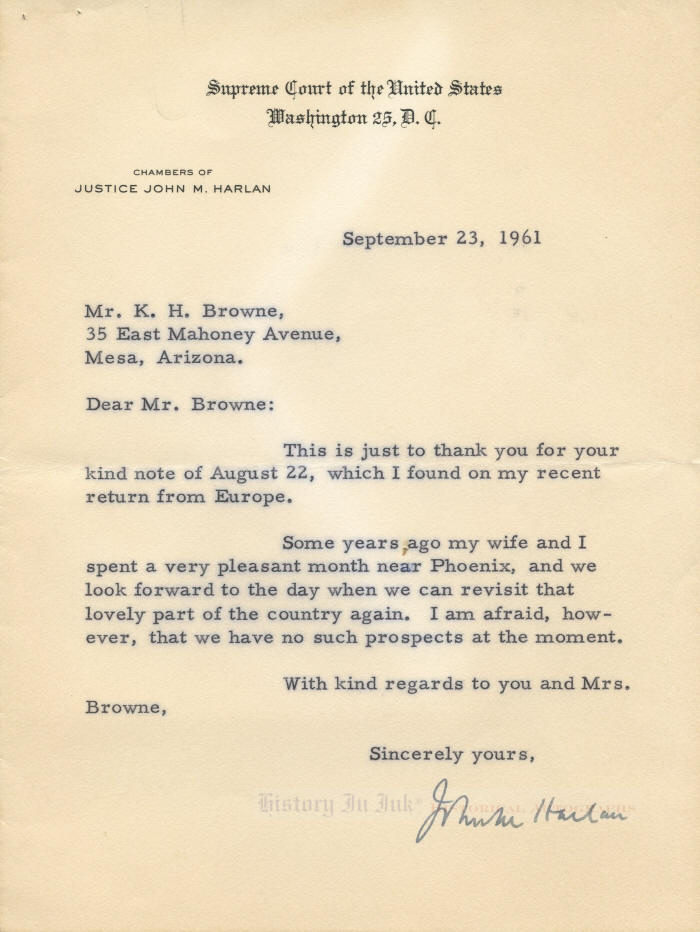2005803
John Marshall Harlan
“ . . . we look forward to the day when we can revisit that lovely part of the country again”
John Marshall Harlan, 1899–1971. Associate Justice, Supreme Court of the United States, 1955–1971. Typed Letter Signed, John M Harlan, one page, 5¾” x 7½”, with integral leaf attached, on engraved stationery of the Supreme Court of the United States, September 23, 1961. With original envelope.
Harlan’s letters are not common and only infrequently appear on the autograph market. Our search of auction records showed only a few sold since 1975. Harlan is much more often found in signed Supreme Court cards, photos, and souvenir items.
Here Justice Harlan acknowledges a letter and apparent invitation from Kenneth H. Browne, a long-time Arizona banker. In full: “This is just to thank you for your kind note of August 22, which I found on my recent return from Europe. / Some years ago my wife and I spent a very pleasant month near Phoenix, and we look forward to the day when we can revisit that lovely part of the country again. I am afraid, however, that we have no such prospects at the moment. / With kind regards . . . ”
Harlan, the namesake and grandson of the first Justice John Marshall Harlan, was educated at Princeton and was a Rhodes Scholar at Oxford, where he read law. He received his law degree from New York Law School in 1925 and spent most of his early legal career in private practice with a distinguished Wall Street firm. He also served as an assistant United States Attorney, 1925–1927, and a New York special assistant attorney general, 1928–1930, and later as chief counsel to the New York State Crime Commission, 1951–1953.
President Dwight D. Eisenhower appointed Harlan to the United States Court of Appeals for the Second Circuit in 1954, but he served there only ten months. In 1955, Eisenhower promoted him to the Supreme Court, where he served until he resigned shortly before his death in 1971.
Harlan was the intellectual leader of the Supreme Court’s conservatives, frequently dissenting from the liberal activist decisions of the Warren Court. He defended federalism against the centralization of power, believing that federal courts should not interfere in state and local matters and that the political process, rather than lawsuits, should be used to correct political and social ills. He never agreed that the 14th Amendment, adopted after the Civil War primarily to protect the rights of former slaves, applied to the states the provisions of the Bill of Rights, which originally limited only to the power of the federal government.
Harlan was widely respected, even by his opponents, for his thoroughness and fairness. It was said that if either the plaintiff or the defendant could pick the judge, neither would pick Harlan, but that if the plaintiff and the defendant together had to pick the judge, Harlan would be their choice. When the Supreme Court’s majority rushed to allow the New York Times and the Washington Post to publish the secret Pentagon Papers—the case took just 15 days from its inception through the Court’s ruling—Harlan dissented, believing that the Court had been “almost irresponsibly feverish” in handling the case and offering a laundry list of preliminary jurisdictional and other questions that he thought the Court should address before moving on to the merits of the case.
Harlan was also respected for his civility. Although he publicly disagreed with Justice Hugo L. Black many times, privately the two were close friends.
This letter is a nice example. Harlan has signed in blue-gray fountain pen. The letter has one normal horizontal mailing fold, not affecting the signature. There is some toning from storage on both the front of the letter and the accompanying envelope, and there are darker toned areas on the back of the integral leaf and the back of the envelope. The letter has staple holes and a paper clip impression at the upper left. The envelope has been cleanly opened at the top, and staple holes affect the 4¢ Lincoln postage stamp. Overall the letter and envelope are in very good condition.
Unframed. Please ask us about custom framing this piece.








